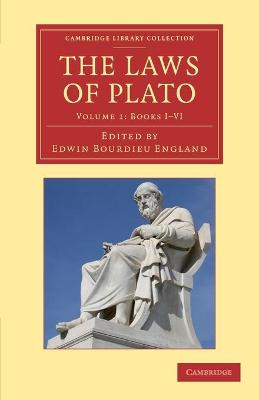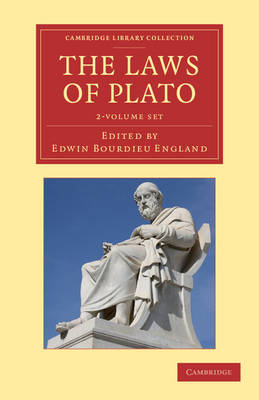Cambridge Library Collection - Classics
1 primary work • 4 total works
Volume 1
One of the most widely studied texts of ancient philosophy and politics, Plato's Laws is his last and most substantial dialogue, debating crucial questions on the subject of law-giving and education. This two-volume edition of 1921 was prepared by the classicist Edwin Bourdieu England (1847–1936), who describes the dialogue as 'the treasury of pregnant truths which Plato in extreme old age left … as his last legacy to humanity'. Generally held to have been written after Plato's failed attempt to influence Syracusan politics, it concerns the just city and its constitution, including discussions of divine revelation, the role of intelligence in the creation of laws, and natural law itself. This edition comprises a short introduction, England's helpful analyses, the Greek text of the dialogue, and extensive notes. Volume 1 is devoted to Books 1–6.
One of the most widely studied texts of ancient philosophy and politics, Plato's Laws is his last and most substantial dialogue, debating crucial questions on the subject of law-giving and education. This two-volume edition of 1921 was prepared by the classicist Edwin Bourdieu England (1847-1936), who describes the dialogue as 'the treasury of pregnant truths which Plato in extreme old age left ... as his last legacy to humanity'. Generally held to have been written after Plato's failed attempt to influence Syracusan politics, it concerns the just city and its constitution, including discussions of divine revelation, the role of intelligence in the creation of laws, and natural law itself. This edition comprises a short introduction, England's helpful analyses, the Greek text of the dialogue, and extensive notes. Volume 1 contains Books 1-6. Volume 2 contains Books 7-12. It also includes indexes of subjects and Greek words.
One of the most widely studied texts of ancient philosophy and politics, Plato's Laws is his last and most substantial dialogue, debating crucial questions on the subject of law-giving and education. This two-volume edition of 1921 was prepared by the classicist Edwin Bourdieu England (1847-1936), who describes the dialogue as 'the treasury of pregnant truths which Plato in extreme old age left ... as his last legacy to humanity'. Generally held to have been written after Plato's failed attempt to influence Syracusan politics, it concerns the just city and its constitution, including discussions of divine revelation, the role of intelligence in the creation of laws, and natural law itself. This edition comprises a short introduction, England's helpful analyses, the Greek text of the dialogue, and extensive notes. Volume 2 is devoted to Books 7-12. It also includes indexes of subjects and Greek words.
One of the most widely studied texts of ancient philosophy and politics, Plato's Laws is his last and most substantial dialogue, debating crucial questions on the subject of law-giving and education. This two-volume edition of 1921 was prepared by the classicist Edwin Bourdieu England (1847-1936), who describes the dialogue as 'the treasury of pregnant truths which Plato in extreme old age left ... as his last legacy to humanity'. Generally held to have been written after Plato's failed attempt to influence Syracusan politics, it concerns the just city and its constitution, including discussions of divine revelation, the role of intelligence in the creation of laws, and natural law itself. This edition comprises a short introduction, England's helpful analyses, the Greek text of the dialogue, and extensive notes. Volume 1 is devoted to Books 1-6.


